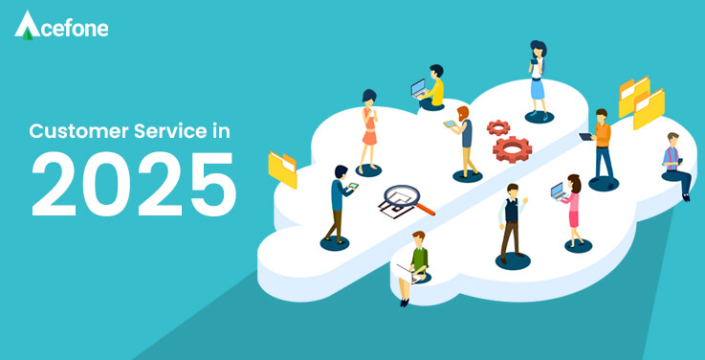In today’s competitive business landscape, customer service is no longer just about solving problems; it’s about creating lasting relationships with customers. As we move into 2025, businesses are leveraging artificial intelligence (AI) to transform customer service processes, boost efficiency, and meet ever-evolving consumer expectations. AI’s ability to analyze data, provide real-time insights, and automate repetitive tasks makes it an indispensable tool for businesses aiming to deliver exceptional customer experiences.
This article delves into how AI is revolutionizing customer service in 2025, the tangible benefits it offers, and the strategies businesses can adopt to integrate AI effectively. Whether you’re managing a growing startup or a large enterprise, embracing AI can be a game-changer in staying ahead of the competition.
How AI Enhances Customer Service Efficiency
AI-powered solutions are reshaping the customer service landscape by automating routine tasks, offering personalized interactions, and enabling real-time decision-making. Here’s how AI makes a difference:
Intelligent Automation
One of the most significant contributions of AI in customer service is automating repetitive and time-consuming tasks. Chatbots, for instance, handle customer inquiries, provide instant responses, and even assist with order placements or refunds. Unlike traditional automation systems, AI-driven tools use natural language processing (NLP) to understand and respond to customer queries in a human-like manner.
By automating these tasks, businesses free up their human agents to focus on more complex issues, thereby improving productivity and efficiency. For businesses looking to streamline operations, integrating AI-powered tools is a strategic move. Learn more about the broader impact of AI on businesses through AI and Automation.
Real-Time Customer Insights
AI excels in analyzing large volumes of customer data to extract actionable insights. By tracking customer interactions, purchase history, and preferences, AI tools help businesses tailor their services to individual needs. Real-time insights enable customer service teams to anticipate issues and resolve them proactively, enhancing customer satisfaction.
For example, AI can detect patterns in customer complaints, allowing businesses to identify and address recurring problems quickly. This proactive approach reduces response times and builds customer trust. To stay updated on the latest business trends, visit Business Trends.

Personalized Customer Experiences
AI-driven tools like recommendation engines and sentiment analysis are pivotal in creating personalized customer experiences. By analyzing customer data, AI can predict preferences and suggest products or services that align with individual needs. Personalization not only improves the customer experience but also boosts brand loyalty and retention.
To discover innovative ways to enhance customer engagement, explore Content Marketing and Digital Marketing.
Key Benefits of AI in Customer Service
Reduced Response Times
AI-powered chatbots and virtual assistants operate 24/7, ensuring that customer inquiries are addressed instantly, regardless of time zones or business hours. This reduces response times and improves customer satisfaction.
Cost Efficiency
Implementing AI tools helps businesses save on operational costs by reducing the need for large customer support teams. Automated systems handle routine tasks efficiently, allowing companies to allocate resources to more critical areas.
Scalability
AI-driven customer service solutions are easily scalable, making them ideal for businesses experiencing rapid growth. Whether you’re a small startup or a global enterprise, AI can adapt to your needs and grow alongside your business. For ideas on scaling your business, check out Startup Growth Strategies.

Consistent Service Quality
Unlike human agents who may have varying levels of performance, AI tools deliver consistent service quality. They ensure that every customer interaction is handled with the same level of efficiency and accuracy.
Applications of AI in Customer Service
AI-Powered Chatbots
Chatbots are perhaps the most common application of AI in customer service. These virtual assistants handle a wide range of tasks, from answering FAQs to guiding customers through the purchase process. Advanced chatbots use machine learning to improve over time, providing increasingly accurate and helpful responses.
Sentiment Analysis
AI tools can analyze the tone and sentiment of customer interactions to gauge satisfaction levels. Sentiment analysis helps businesses identify unhappy customers and address their concerns proactively, reducing churn rates.
Predictive Analytics
Predictive analytics enables businesses to anticipate customer needs and take proactive measures. For instance, AI can predict when a customer might need support based on their browsing behavior or interaction history. This level of anticipation enhances the customer experience and fosters loyalty.
Omnichannel Support
AI integrates seamlessly across multiple communication channels, including social media, email, live chat, and phone support. This ensures a cohesive customer experience, regardless of how or where customers choose to interact with a business.
AI-Driven Knowledge Bases
AI can power self-service portals that provide customers with instant access to solutions and resources. These knowledge bases are continuously updated and optimized to ensure relevance and accuracy.
Overcoming Challenges in AI Adoption
While AI offers numerous benefits, businesses may face challenges in its implementation:
Data Privacy Concerns
With AI systems analyzing vast amounts of customer data, ensuring compliance with data protection regulations is crucial. Businesses must prioritize data security to build trust and protect customer information.
High Initial Costs
The upfront investment required to implement AI tools can be a barrier, especially for small businesses. However, the long-term cost savings and efficiency gains often outweigh the initial expenses.
For ideas on overcoming financial constraints, explore Small Business Ideas and Online Business.
Employee Resistance
AI adoption may face resistance from employees who fear job displacement. Businesses need to focus on upskilling their workforce and emphasizing the collaborative potential of AI.
The Future of AI in Customer Service
As AI technologies continue to evolve, their role in customer service will only grow. Here are some trends to watch:
Voice Assistants
Voice-activated AI systems like Alexa and Google Assistant are becoming integral to customer service. These tools allow customers to interact with businesses using voice commands, making interactions more intuitive.
Hyper-Personalization
AI will enable hyper-personalized customer experiences by leveraging advanced data analytics. Businesses will be able to deliver highly customized solutions that resonate with individual customers.
AI and Human Collaboration
The future of customer service lies in the collaboration between AI and human agents. AI will handle routine tasks, while human agents focus on complex and emotionally charged interactions.
Sustainable AI Solutions
As businesses prioritize sustainability, AI will play a crucial role in optimizing resources and reducing waste. Learn more about sustainable business practices at Sustainable Businesses.
How to Implement AI in Customer Service
- Identify Key Areas for Automation: Start by analyzing your customer service workflows to identify tasks that can benefit from automation.
- Choose the Right Tools: Select AI-powered solutions that align with your business goals and customer needs.
- Train Your Team: Upskill your employees to work alongside AI tools and maximize their potential.
- Monitor Performance: Continuously evaluate the performance of your AI systems to ensure they deliver desired outcomes.
For additional guidance on leveraging AI technologies, visit AI Technologies Tools and AI in Business Operations.
Conclusion
AI is revolutionizing customer service by automating tasks, providing real-time insights, and delivering personalized experiences. As businesses adopt AI in 2025, they can boost efficiency, reduce costs, and enhance customer satisfaction. By embracing AI and staying informed about the latest trends, businesses can secure a competitive edge and build lasting customer relationships.
Explore more insights and strategies for leveraging AI in your business at Blog and Digital Marketing Trends.

